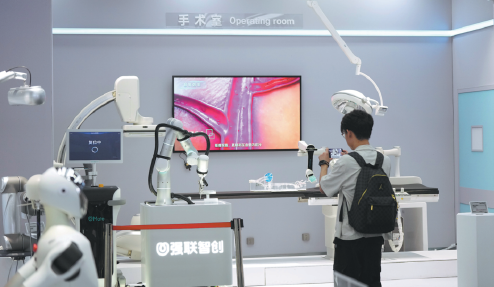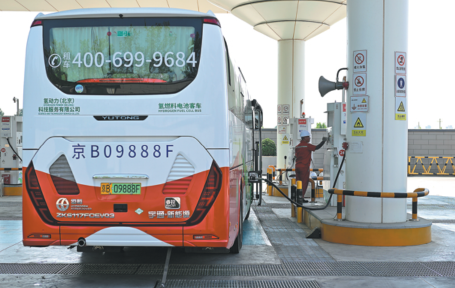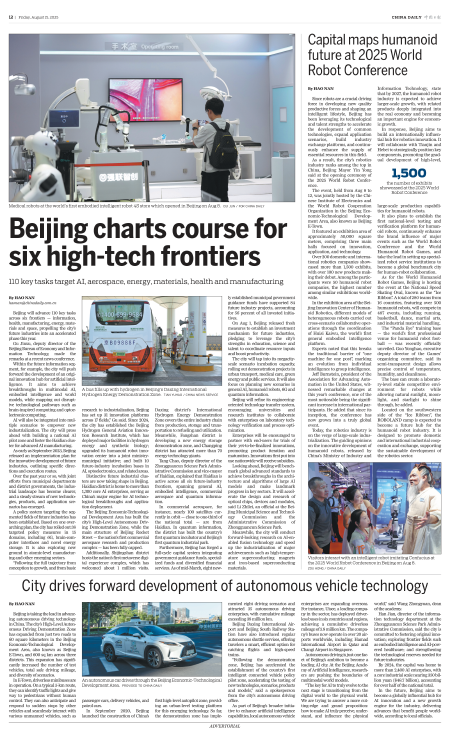
Medical robots at the world's first embodied intelligent robot 4S store which opened in Beijing on Aug 8.

A bus fills up with hydrogen in Beijing's Daxing International Hydrogen Energy Demonstration Zone.
Beijing will advance 110 key tasks across six frontiers — information, health, manufacturing, energy, materials and space, propelling the city's future industries into an accelerated phase this year.
Gu Jinxu, deputy director of the Beijing Bureau of Economy and Information Technology, made the remarks at a recent news conference.
Within the future information segment, for example, the city will push forward the development of an original innovation hub for artificial intelligence. It aims to achieve breakthroughs in multimodal AI, embodied intelligence and world models, while mapping out disruptive technological pathways such as brain-inspired computing and optoelectronic computing.
AI will also be integrated into multiple scenarios to empower new industrialization. The city will press ahead with building a national AI pilot zone and foster the Haidian cluster for advanced AI manufacturing.
As early as September 2023, Beijing released an implementation plan for the innovative development of future industries, outlining specific directions and execution routes.
Over the past year or so, with joint efforts from municipal departments and district governments, the industrial landscape has become clearer, and a steady stream of new technologies, products, and application scenarios has emerged.
A policy system targeting the segmented fields of future industries has been established. Based on one overarching plan, the city has rolled out 38 targeted policy measures in 15 domains, including 6G, brain-computer interfaces and novel energy storage. It is also exploring new ground in atomic-level manufacturing and other emerging sectors.
"Following the full trajectory from conception to growth, and from basic research to industrialization, Beijing has set up 31 innovation platforms across 17 fields," Gu said. Since 2024, the city has established the Beijing Hydrogen General Aviation Innovation Research Institute, which has deployed major facilities in hydrogen energy and synthetic biology; upgraded its humanoid robot innovation center into a joint ministry-municipal initiative; and built 10 future-industry incubation bases in AI, optoelectronics, and related areas.
Distinctive future industrial clusters are now taking shape in Beijing. Haidian district is home to more than 1,300 core AI enterprises, serving as China's major engine for AI technological breakthroughs and application deployment.
The Beijing Economic-Technological Development Area has built the city's High-Level Autonomous Driving Demonstration Zone, while the main structure of Beijing Rocket Street — the nation's first commercial aerospace research and production complex — has been fully capped.
Additionally, Shijingshan district hosts the nation's first metaverse digital experience complex, which has welcomed about 1 million visits. Daxing district's International Hydrogen Energy Demonstration Zone covers the entire industry chain from production, storage and transportation to refueling and utilization. Meanwhile, Fangshan district is developing a new energy storage demonstration zone, and Changping district has attracted more than 70 energy technology giants.
Tang Chao, deputy director of the Zhongguancun Science Park Administrative Commission and vice-mayor of Haidian, explained that Haidian is active across all six future-industry frontiers, spanning general AI, embodied intelligence, commercial aerospace and quantum information.
In commercial aerospace, for instance, nearly 100 satellites currently in orbit — close to one-third of the national total — are from Haidian. In quantum information, the district has built the country's first quantum incubator and Beijing's first quantum industrial park.
Furthermore, Beijing has forged a full-cycle capital system integrating government guidance funds, specialized funds and diversified financial services. As of mid-March, eight newly established municipal government guidance funds have supported 84 future industry projects, accounting for 56 percent of all invested initiatives.
On Aug 1, Beijing released fresh measures to establish an investment mechanism for future industries, pledging to leverage the city's strengths in education, science and talent to coordinate resource inputs and boost productivity.
The city will tap into its megacity-scale scenario incubation capacity, rolling out demonstration projects in urban transport, medical care, green energy and public services. It will also focus on planning new scenarios in general AI, humanoid robots, 6G and quantum information.
Beijing will refine its engineering-oriented technology transfer system, encouraging universities and research institutes to collaborate with enterprises on laboratory technology verification and process optimization.
Enterprises will be encouraged to partner with end-users for trials of their yet-to-be-finalized innovations, promoting product iteration and maturation. Innovations first put into use nationwide will receive subsidies.
Looking ahead, Beijing will benchmark global advanced standards to achieve breakthroughs in the architecture and algorithms of large AI models and make landmark progress in key sectors. It will accelerate the design and research of optical chips, devices and modules, said Li Zhilei, an official at the Beijing Municipal Science and Technology Commission and the Administrative Commission of Zhongguancun Science Park.
Meanwhile, the city will conduct forward-looking research on AI-enabled fusion technology and speed up the industrialization of major achievements such as high-temperature superconducting magnets and iron-based superconducting materials.
haonan@chinadaily.com.cn

